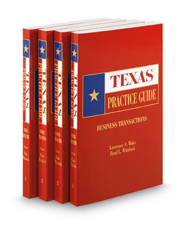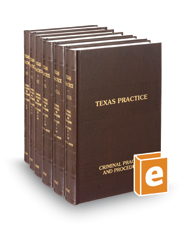 Canvas myLAW Email Library Account
Course and Research Guides
A-Z Database List
Canvas myLAW Email Library Account
Course and Research Guides
A-Z Database List
 Canvas myLAW Email Library Account
Course and Research Guides
A-Z Database List
Canvas myLAW Email Library Account
Course and Research Guides
A-Z Database List
Note that the Criminal Procedure (Federal) Texas has many general criminal procedure treatises linked and those treatises will cite authority that applies to Texas. This course guide will add Texas specific online criminal procedure treatises.
 Criminal Practice and Procedure (Texas Practice Guide)
by
D. Mark Elliston & Terrence W. Kirk
Criminal Practice and Procedure (Texas Practice Guide)
by
D. Mark Elliston & Terrence W. Kirk
 Texas Practice Series: Criminal Forms & Trial Manual
Texas Practice Series: Criminal Forms & Trial Manual
 Texas Practice Series: Criminal Practice & Procedure
Texas Practice Series: Criminal Practice & Procedure